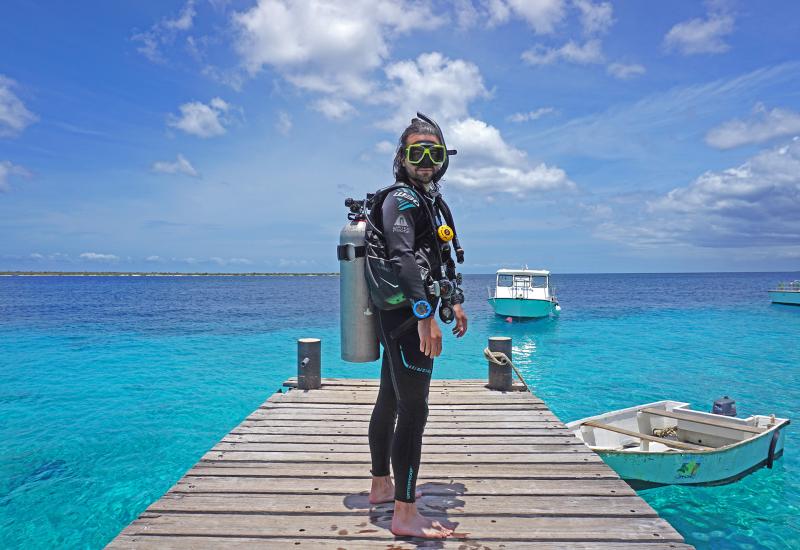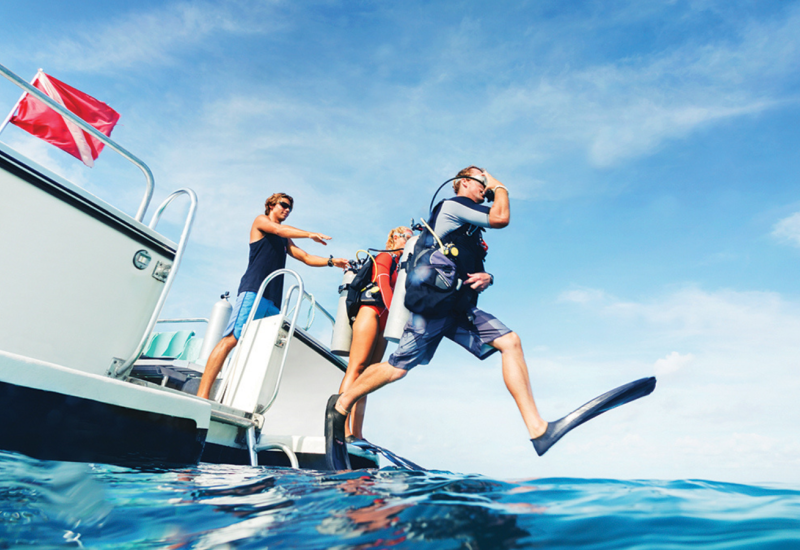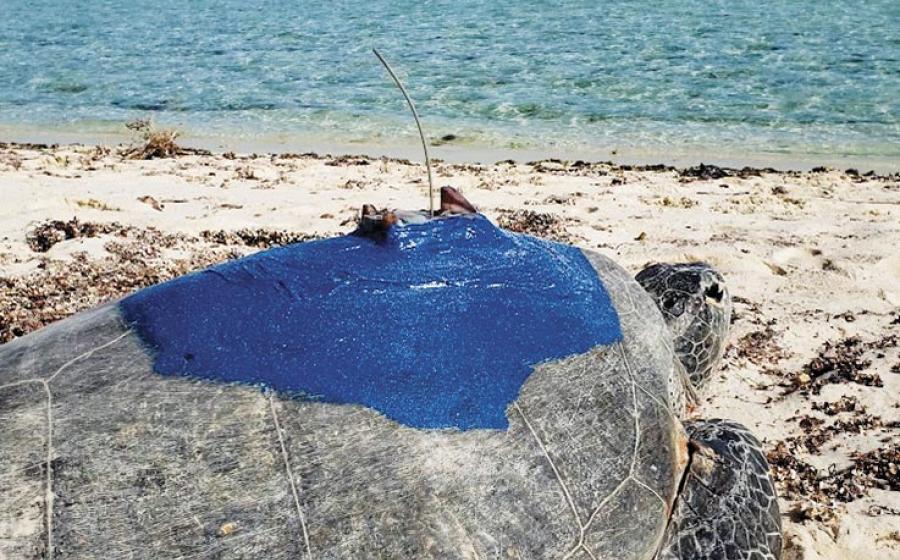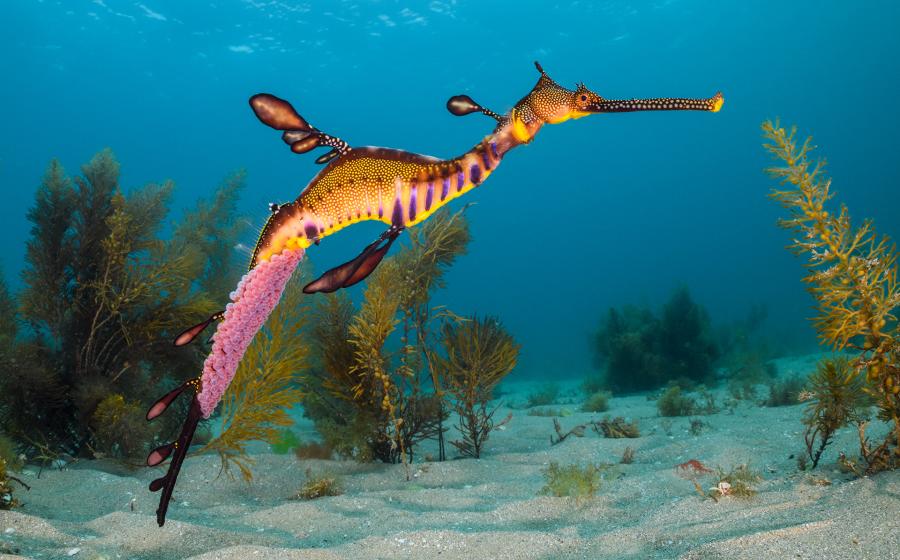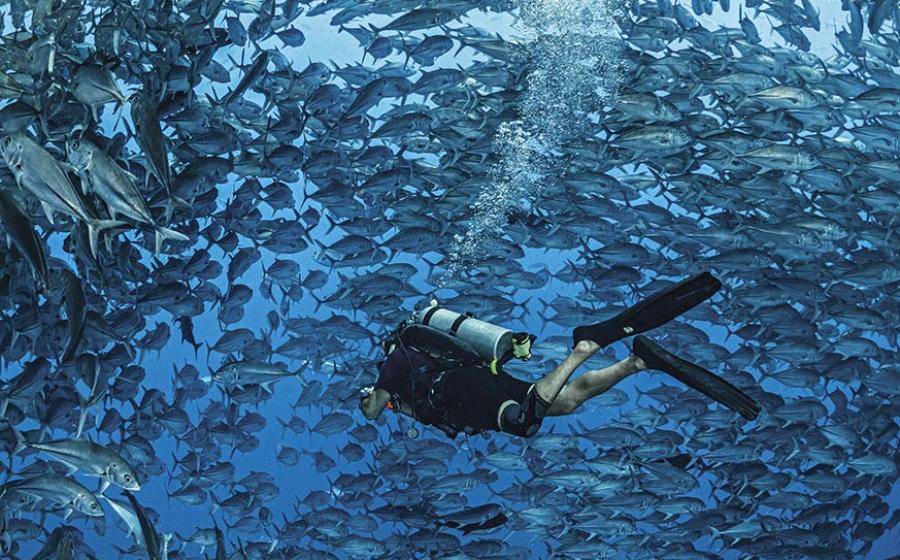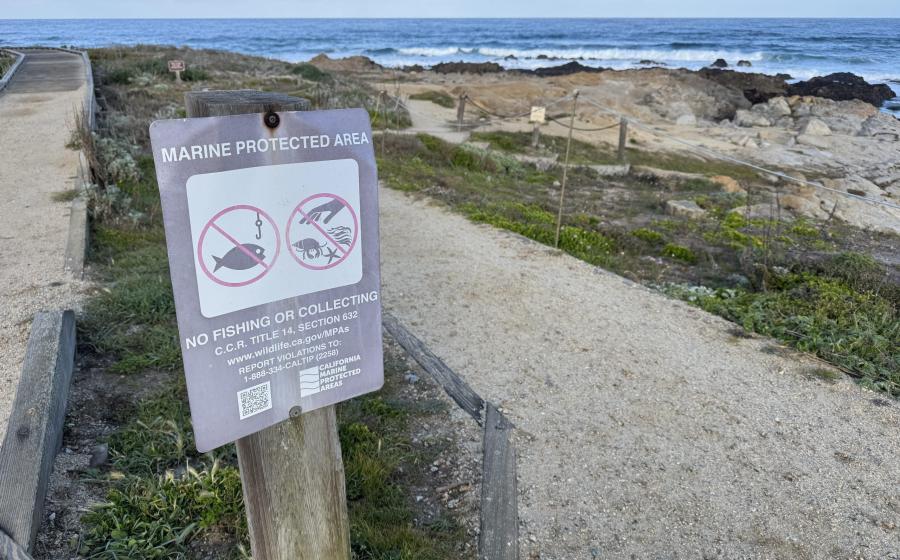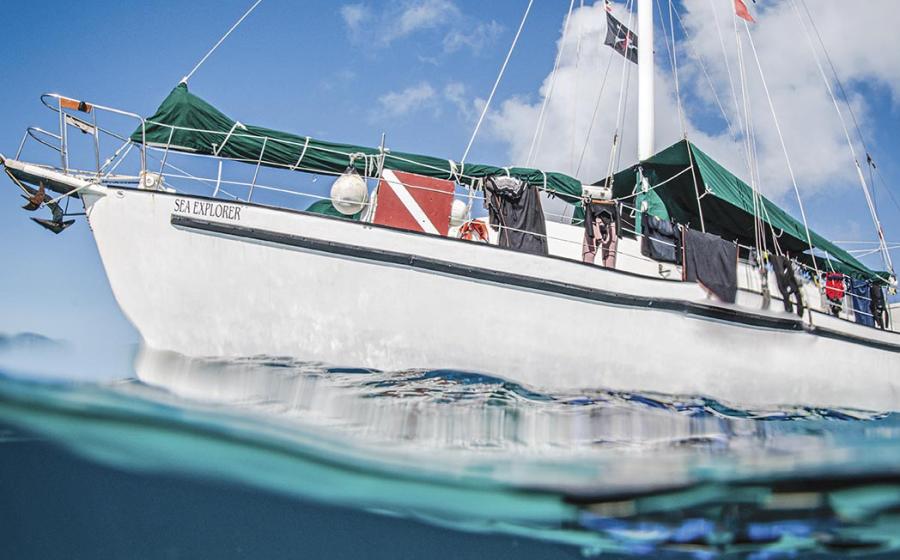Ask An Instructor - November 2008
By Michael Ange
Q: I recently became nitrox certified and made a series of dives on a live-aboard. It seemed like I used up my air at a faster rate than when using air. The dives were not any longer than I did on air on the same boat at the same dive site. I have more than 100 dives under my belt, so I don't think it was anxiety, stress or new skills causing increased consumption. Why would this happen?
A: I've never heard of this happening. In fact, most nitrox divers actually feel they use slightly less gas when diving nitrox because of the increased oxygen content. Your gas consumption rates are influenced by a multitude of factors, including gear configuration, how much rest you've had before the dive, sea conditions, currents and even your general mental outlook and sense of well-being on the day of your dive. It is far more likely that one of these extraneous factors impacted your gas consumption rate. Or maybe the tanks were slightly different sizes. As a general rule, to accurately evaluate your gas consumption, you need to calculate it. (See scubadiving.com/article/Make_the_Most_of_Every_Tank.) Once you calculate your consumption rate, you should also average it. Check your consumption periodically over a number of dives, add the numbers together and divide by the number of dives to find out what your average gas consumption should be. If you want to test your hypothesis on nitrox, recalculate you gas consumption using nitrox. Odds are that you are going to find very little difference over the course of several dives--although you may find dramatic differences on a single isolated dive.
Q: My wife and I are just getting into diving and have been looking at different places to go for our next dive trip. We've noticed various dive sites have experience levels attributed to them. Can you define what beginner, novice, intermediate and advanced means?
A: These designations don't necessarily correspond to specific skills or conditions, and because the ocean is unpredictable, the required experience level can change from time to time depending on current and conditions. Also, almost all major dive destinations have a variety of dive site options that will fit the needs of all experience levels. Here are general guidelines:
Beginner: Sites considered suitable for training open water students or introductory (noncertified) divers. Generally shallow, no more than 40 feet deep, with little to no current and flat calm seas.
Novice: Slightly deeper, about 60 feet, with potentially mild to moderate currents and surface conditions.
Intermediate: These can include a variety of environments, such as reefs or wrecks, up to about 100 feet deep. Strong currents, surge and heavy seas are distinct possibilities, and there may be swim-throughs in the reef, rocks or wrecks that would be considered overhead environments only suitable for divers with appropriate experience and training.
Advanced: Depths of 100 feet or more, strong currents, exposed locations where wind and ocean swells can make getting in and out of the boat more challenging, and the potential for serious and/or dangerous wreck or cave penetration can all earn dive sites an advanced rating.
Tell the operator about your past diving experiences and ask about the different dives they offer. If you or the dive operator feels that a particular dive is well beyond your experience level, you almost always have the option of hiring a private guide.
Q: It's not unusual for me to feel seasick on the boat ride out to a dive site, and I normally feel better when I get in the water. On a recent dive trip, my nausea went away after I descended. But after about 30 minutes on the bottom, I became very nauseated, to the point I almost threw up through my regulator. I ascended immediately. This has never happened to me before. Could this be caused by contaminated air, even though no one else on the trip had this problem?
A: Seasickness can vary in its intensity for many reasons, ranging from your diet in the 24 hours or so before the dives to your level of fatigue. Based on your description, it sounds as though you just had a worse bout of seasickness on this dive than on any previous dive. It's not uncommon for divers who get seasick to remain sick even after they return to shore. Although it's possible, it is extremely unlikely that your nausea resulted from contaminated air, especially since the other people on the boat, who presumably got their air from the same source, weren't affected. It is, however, possible that you ate something that mildly disagreed with you, and although the food itself did not make you sick, when coupled with your inclination toward motion sickness, it caused you to have a worse bout of seasickness than usual.
Q: Whenever I get in the water and start to descend, I have a panic attack. I have to resurface until I get my act together, then I feel fine once I get back down. How can I fix this problem?
A: You need to take control. Make sure you get your act together before you go down. Talk to the divemaster before the dive, and ask to be one of the first divers in the water. Once in, float on the surface with your face in the water, taking deep breaths from your regulator until you feel absolutely comfortable. When you feel ready to go down, use a descent line and go slow. If you start to feel anxious, stop your descent and try to maintain control by focusing on the descent line and your breathing. Fight the urge to go up, and take long, deliberate breaths until you feel the anxiety subside--then continue down.
The best way to deal with this problem in the long run is to dive as frequently as you can in a variety of different environments, always making sure you stay well within your comfort zone. There is probably a local dive site somewhere near your home, so to keep your fins in the water and your skills sharp, try to dive a couple of times per month.
Q: I am pretty comfortable clearing my mask underwater, but I wear contacts and I often wonder what I would do if my mask was knocked completely off underwater. My instinct is to close my eyes to keep from losing my contacts, and with the mask off, it seems there are only two options: 1) open them and lose my contacts, hoping to find the mask (unlikely with bad eyesight) or 2) have my buddy retrieve the mask for me. Is there a recommended procedure for recovering a mask in this situation?
A: First, no matter how good your vision is on land, it will be horrible when you're trying to see underwater without a mask. It is actually extremely rare for a diver to completely lose their mask underwater, but if you do, with or without contacts, it's unlikely that you will find it again unless you're not moving, it falls directly in front of you and it doesn't get knocked around by current or surge. Closing your eyes is the best way to keep from losing your contacts, so you would need to have your buddy readily available to help you find the mask. If not, you should make do a controlled ascent without it. If you have concerns about the loss of your mask, take a tip from technical divers: Because they are completely dependent on their mask to safely ascend and complete decompression stops at the end of a dive, many of them carry a spare mask in an accessory pocket on their BC or exposure suit.
Got a question you need answered?
E-mail it to [email protected], or write to:
Ask An Instructor
6600 Abercorn St., Suite 208,
Savannah, GA 31405
By Michael Ange
Q: I recently became nitrox certified and made a series of dives on a live-aboard. It seemed like I used up my air at a faster rate than when using air. The dives were not any longer than I did on air on the same boat at the same dive site. I have more than 100 dives under my belt, so I don't think it was anxiety, stress or new skills causing increased consumption. Why would this happen?
A: I've never heard of this happening. In fact, most nitrox divers actually feel they use slightly less gas when diving nitrox because of the increased oxygen content. Your gas consumption rates are influenced by a multitude of factors, including gear configuration, how much rest you've had before the dive, sea conditions, currents and even your general mental outlook and sense of well-being on the day of your dive. It is far more likely that one of these extraneous factors impacted your gas consumption rate. Or maybe the tanks were slightly different sizes. As a general rule, to accurately evaluate your gas consumption, you need to calculate it. (See scubadiving.com/article/Make_the_Most_of_Every_Tank.) Once you calculate your consumption rate, you should also average it. Check your consumption periodically over a number of dives, add the numbers together and divide by the number of dives to find out what your average gas consumption should be. If you want to test your hypothesis on nitrox, recalculate you gas consumption using nitrox. Odds are that you are going to find very little difference over the course of several dives--although you may find dramatic differences on a single isolated dive.
Q: My wife and I are just getting into diving and have been looking at different places to go for our next dive trip. We've noticed various dive sites have experience levels attributed to them. Can you define what beginner, novice, intermediate and advanced means?
A: These designations don't necessarily correspond to specific skills or conditions, and because the ocean is unpredictable, the required experience level can change from time to time depending on current and conditions. Also, almost all major dive destinations have a variety of dive site options that will fit the needs of all experience levels. Here are general guidelines:
Beginner: Sites considered suitable for training open water students or introductory (noncertified) divers. Generally shallow, no more than 40 feet deep, with little to no current and flat calm seas.
Novice: Slightly deeper, about 60 feet, with potentially mild to moderate currents and surface conditions.
Intermediate: These can include a variety of environments, such as reefs or wrecks, up to about 100 feet deep. Strong currents, surge and heavy seas are distinct possibilities, and there may be swim-throughs in the reef, rocks or wrecks that would be considered overhead environments only suitable for divers with appropriate experience and training.
Advanced: Depths of 100 feet or more, strong currents, exposed locations where wind and ocean swells can make getting in and out of the boat more challenging, and the potential for serious and/or dangerous wreck or cave penetration can all earn dive sites an advanced rating.
Tell the operator about your past diving experiences and ask about the different dives they offer. If you or the dive operator feels that a particular dive is well beyond your experience level, you almost always have the option of hiring a private guide.
Q: It's not unusual for me to feel seasick on the boat ride out to a dive site, and I normally feel better when I get in the water. On a recent dive trip, my nausea went away after I descended. But after about 30 minutes on the bottom, I became very nauseated, to the point I almost threw up through my regulator. I ascended immediately. This has never happened to me before. Could this be caused by contaminated air, even though no one else on the trip had this problem?
A: Seasickness can vary in its intensity for many reasons, ranging from your diet in the 24 hours or so before the dives to your level of fatigue. Based on your description, it sounds as though you just had a worse bout of seasickness on this dive than on any previous dive. It's not uncommon for divers who get seasick to remain sick even after they return to shore. Although it's possible, it is extremely unlikely that your nausea resulted from contaminated air, especially since the other people on the boat, who presumably got their air from the same source, weren't affected. It is, however, possible that you ate something that mildly disagreed with you, and although the food itself did not make you sick, when coupled with your inclination toward motion sickness, it caused you to have a worse bout of seasickness than usual.
Q: Whenever I get in the water and start to descend, I have a panic attack. I have to resurface until I get my act together, then I feel fine once I get back down. How can I fix this problem?
A: You need to take control. Make sure you get your act together before you go down. Talk to the divemaster before the dive, and ask to be one of the first divers in the water. Once in, float on the surface with your face in the water, taking deep breaths from your regulator until you feel absolutely comfortable. When you feel ready to go down, use a descent line and go slow. If you start to feel anxious, stop your descent and try to maintain control by focusing on the descent line and your breathing. Fight the urge to go up, and take long, deliberate breaths until you feel the anxiety subside--then continue down.
The best way to deal with this problem in the long run is to dive as frequently as you can in a variety of different environments, always making sure you stay well within your comfort zone. There is probably a local dive site somewhere near your home, so to keep your fins in the water and your skills sharp, try to dive a couple of times per month.
Q: I am pretty comfortable clearing my mask underwater, but I wear contacts and I often wonder what I would do if my mask was knocked completely off underwater. My instinct is to close my eyes to keep from losing my contacts, and with the mask off, it seems there are only two options: 1) open them and lose my contacts, hoping to find the mask (unlikely with bad eyesight) or 2) have my buddy retrieve the mask for me. Is there a recommended procedure for recovering a mask in this situation?
A: First, no matter how good your vision is on land, it will be horrible when you're trying to see underwater without a mask. It is actually extremely rare for a diver to completely lose their mask underwater, but if you do, with or without contacts, it's unlikely that you will find it again unless you're not moving, it falls directly in front of you and it doesn't get knocked around by current or surge. Closing your eyes is the best way to keep from losing your contacts, so you would need to have your buddy readily available to help you find the mask. If not, you should make do a controlled ascent without it. If you have concerns about the loss of your mask, take a tip from technical divers: Because they are completely dependent on their mask to safely ascend and complete decompression stops at the end of a dive, many of them carry a spare mask in an accessory pocket on their BC or exposure suit.
Got a question you need answered?
E-mail it to [email protected], or write to:
Ask An Instructor
6600 Abercorn St., Suite 208,
Savannah, GA 31405



